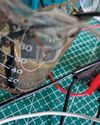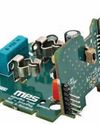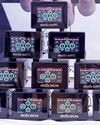"AI PROCESSOR CHIPLETS Enable Small Companies TO SOLVE A HUGE PROBLEM By Breaking It Into Smaller Problems"
Electronics For You
|August 2023
Tenstorrent CEO Jim Keller believes that Al processors will continue to get bigger so that more people can participate and build high-performance Al models. Yashasvini Razdan from Electronics For You spoke to Keller to gain his views on the future of Al processors and RISC-V technology
-

How would you explain your new technology?
We are making a novel artificial intelligence (AI) computer. AI computers do massive amounts of dense mathematical computation and perform a large number of operations.
Computation is similar to how the brain works. Your brain is made out of around 10,000 groups of cells that talk to each other, locally, and then they talk to each other broadly. You can think of AI problems as very intense mathematics. Computations are done in the brain when many cells exchange information with each other, and they just keep doing it to make the brain work.
We’re building a computer that can do a lot of mathematics, but also communicate the results of each step of the calculations. That kind of representation is trainable and leads to interesting results with AI software.
To sum it up, we are building hardware that has a large number of independent processors and we’re building software that can take the company’s AI program and spread it across those processors, and those processors can talk to each other, natively. This gives us an advantage on how to write the code and also advantages on the cost of the computer and the cost of the system.
What is the advantage of having multiple chips instead of a single processor?
A single server chip is big and very expensive. It’s a single piece of silicon with multiple functions on that one piece. If we divide that chip into four pieces, each piece, called a chiplet, is smaller. You can now put the memory interface on one piece, the network interface on another piece, the IO interface on another, and so on. So now each piece is simpler to build.
Dit verhaal komt uit de August 2023-editie van Electronics For You.
Abonneer u op Magzter GOLD voor toegang tot duizenden zorgvuldig samengestelde premiumverhalen en meer dan 9000 tijdschriften en kranten.
Bent u al abonnee? Aanmelden
MEER VERHALEN VAN Electronics For You

Electronics For You
Tech Majors Are Racing TOWARDS NET-ZERO - What About You?
Apple, Microsoft, Amazon, Google, Infosys, Wipro—global and Indian firms are heading closer to achieving net-zero emissions, a mandate to combat climate change. Here is what you need to know to start your journey...
12 mins
December 2025

Electronics For You
Miniature IoT WATER TDS And LEVEL MONITOR Cum CONTROLLER
For setups that rely on stored water, clear awareness of tank level and water quality is essential.
3 mins
December 2025

Electronics For You
The Impact Of GENERATIVE AI On The Future Of AUTOMOTIVE AND EVs
Autonomous vehicles, connected ecosystems, and smart factories are only the beginning. Generative Al is pushing the auto industry beyond predictions into a bold era of creativity-from EV design to real-time diagnostics and showroom automation. Here is how GenAl is reshaping innovation across the automotive value chain.
8 mins
December 2025

Electronics For You
How AI Tools Are Making SOFTWARE DEVELOPMENT BETTER
AI is reshaping how we code, debug, and collaborate. From Copilot to automation, it is changing software development in ways worth exploring.
3 mins
December 2025
Electronics For You
How AI Tools Are Making SOFTWARE DEVELOPMENT BETTER
AI is reshaping how we code, debug, and collaborate. From Copilot to automation, it is changing software development in ways worth exploring.
3 mins
December 2025

Electronics For You
5 Interesting Reference Designs FOR SMART HOMES
Smart home devices are transforming the way people interact with their appliances. They make homes more convenient, secure, and energy-efficient. From smart plugs and energy monitors to smart locks and thermostats, reference designs help design engineers create connected products that are easy to use, consume less power, and are reliable. These designs allow you to control devices remotely, track energy use, extend battery life, and automate routines. They provide practical solutions for upgrading homes and small commercial spaces without major modifications.
3 mins
December 2025

Electronics For You
Fancy USB LED VASE
This USB LED vase is a simple yet elegant device that fuses art with electronics to create a decorative lighting display. Powered directly from a standard USB port, it uses readily available components such as MOSFETs, resistors, capacitors, and LEDs to produce a striking, dynamic sequence of lights.
3 mins
December 2025

Electronics For You
"WHAT OTHERS SELL IN FOUR BOXES WE BUILT IN ONE"
Years of custom field work are shaping a product line with its own cloud, its own hardware, and a market that is now beginning to recognise its value.
8 mins
December 2025

Electronics For You
BUILD LARGE LANGUAGE MODELS
Large language models are machine learning models designed for a range of language-related tasks such as text generation and translation. Here’s how open source software can help you build your own large language model.
6 mins
December 2025

Electronics For You
Rare Earth Or Rare Ingenuity? India Remains Between The Two
With China firmly controlling rare earth exports, India confronts a critical moment in its technological trajectory.
8 mins
December 2025
Translate
Change font size

